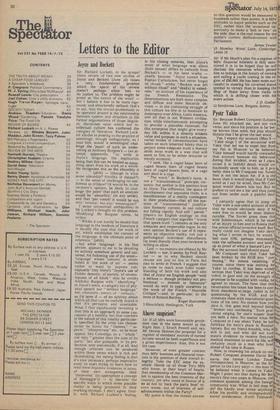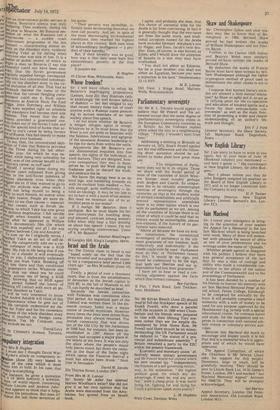Pyotr Yakin •
Sir: Because Robert Conquest (Letters, is,,. June 16) attacked me, and not vice iht versa, and since his position is far betEr, ter known than mine, fair play should ou dictate that I be given the last word. dis
Yes, I expect my account (May 5 —
'Yakir sings ') of the encounter with sat Yakir that led me to expel him froin to my flat in Moscow to be believed. No Yakir himself would hardly contradict oel that account because my behaviour during that incident, even as I chronicled it in faithful detail, would undoubtedly seem vile to him, as it protic bably does to Mr Conquest too. Surely vht that is not the issue; for, if it is the vat. issue, then it would imply that if Yakir b„ acted as I say he acted, then Mr ConlaA quest would disown him too. But heshi prefers to call me a liar and thus jump 1)5, out from under such a painful deci
sion. Por I certainly agree that to jump only
Yakir with a one-sided account of him Bid, that he would obviously deny if hehis' were free to would be most dishon: ourable. The Soviet press does thissoo" with Solzhenitsyn, which is far moreew of an injury to him and to Russia thane(); the actual official invective itself. But lint, really could not imagine Yakir denyi ing what I wrote; in fact, he would, feel sure (OK, perhaps mistakenly) take the selfsame account and hold Ittir up as proof of what a bastard Levy is, II,.
But the account itself should stand. list Mr Conquest says that Yakir haSttin been broken by the KGB into "con' • fessing." He means recanting, of . course, since there was nothing fortIlv`• Yakir to confess. It has been widely written that Yakir was deprived of al-hat cohol, in gaol and, on the strength of.04re promises to be supplied with vodka, he N., agreed to recant. The form that this bra, recantation has taken has been to conPori front dissidents-at-large, called in for I questioning by the KGB, and in. 1Thi criminate them with inquisitorial questort a tions of his own. No matter how you l ail. slice it, this goes well beyond being s1 " broken into confessing." Such gratlie; uitous singing for one's supper does i'ihe not befit a hero. No matter what Mrktn Conquest or I say about Yakir, he has IN forfeited his hero's place in Russian history. But my friend Amalrik, who is L22 still in jail, and who did not turn an state's evidence to receive first-rate medical treatment to save his life, will certainly count as a man who lived ahead of his time in Russia.
Now, in renewing his attack on me,
Robert Conquest presents David Bonavia, the former London Times correspondent in Moscow, as the hyperton to the Levy satyr — the man to be believed when it comes to Yakir. Might I point out that during Mr Bo• navia's first two years in Moscow, the common question among the foreign community was: What in hell does he do? He hardly ever wrote anything. After his prolific and unimpeachablY sound predecessor, Kyrill Tidmarsh, (nv an international public servant in
• eneva, Bonavia's silence was truly a$t year in Moscow, Mr Bonavia emhturtnovha — a sudden crash eafening. Then suddenly, during his rked on what the Russians call a chievement programme at the last
0ment — concentrating almost en'rely on the dissident story, suddenly (lopting Yakir as his darling when eryone else was sick of him. It is a
f atter of public record, of which as right a man as Bonavia (I say this II ineerely) could not have been unat are, that the Soviet government g egularly expelled foreign correspond'its who had concentrated systemati:* ally on the dissident story to the virs ual exclusion of all else. That had so e bviously become the name of the
O erne that the rawest fledgling correIS could see it. Such corre Pondents as Anatole Shub, Per Emil 'r egge, John Dornberg and William ale were expelled right on schedule 'ter dissidence had become their sole Usiness. This meant that the disidents provided a guaranteed oneay ticket out of the Soviet Union and °to the special kind of kudos that acrues to one's career by being thrown tit of Russia. One had merely to make
issidence your business. h T0 me, then, the concentrated idoliation of Yakir that Bonavia provided
d. the Times during his last shtur°vita year, for which he was exiled, while being very unhealthy for
ir akir, was of the utmost benefit to Mr nnavia's career, so nuff said! • Myself, I several times during my
l„ 0.scow years refrained from giving
to the anti-Soviet polemics of
'.ri0u5 dissidents even when they gged me to. If they wanted to go to ad, my attitude was: ohne mich. I Old not bring myself to being a arty to such heroics, no matter what Ile epic reason. People are more imrtant to me than causes — especialY, lost causes, such as Soviet disIdence, to which Yakir has now given Is dubious imprimatur. I felt terrible nciugh when Amalrik went to jail On after he appeared in William 0Ie's documentary film (for which Ole was expelled) and all I did was nterpret between Cole and Amalrik! To sum up: As I originally wrote, I Pelled Yakir as an act of self-deence. He categorically told me a cerain colleague of mine was a KGB ,gent. My rule in life being that if you as ISten to a slander it -will eventually ri. tick to you, I elaborately unlistened of 0, this one from Yakir. Breaking off th him there and then constituted Y preemptive strike. Whatever else akir may say about me, he could artily accuse me of being a KGB. gent, knowing that no KGB agent °Uld permit hithself the luxury of eaking off contact with such an imrtant dissident as Yakir. I will be very interested to know hat Andrei Amalrik will think of this .rrespondence when he gets out of all He certainly understood my disSte for Yakir and for the careeristic v,ertones of the whole dissident story nere it touched on foreign comendents. Yes, ,Mr Conquest, you aY include me out.
David Levy 22 St Clement's Avenue, Toronto, anada































 Previous page
Previous page